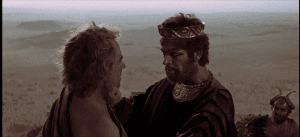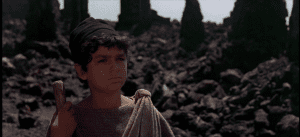 The title speaks of beginnings, but the film itself marked the end of an era. The post-war Bible-movie craze began with Samson and Delilah in 1949, and it arguably reached its peak with the 1959 remake of Ben-Hur. But the genre petered out over the next several years, and The Bible: In the Beginning…, released in 1966, was pretty much the last major Bible film to be produced by a Hollywood studio for the next couple of decades.
The title speaks of beginnings, but the film itself marked the end of an era. The post-war Bible-movie craze began with Samson and Delilah in 1949, and it arguably reached its peak with the 1959 remake of Ben-Hur. But the genre petered out over the next several years, and The Bible: In the Beginning…, released in 1966, was pretty much the last major Bible film to be produced by a Hollywood studio for the next couple of decades.
The problem was not that the film was a flop, per se, but that it cost so much to make. According to Wikipedia, The Bible was the top-grossing movie of its year, with a domestic take of $34 million. But roughly half of that money would have stayed with the theatres, and the film is said to have cost as much as $18 million — and that probably doesn’t count the cost of prints and advertising. So whether the film made its money back would seem to depend on how well it performed overseas.
In any case, I recently revisited this film and noticed a few things that I thought were worth noting here. (See also my recent post on Abraham and the Three Visitors, which discusses one scene from this film that I don’t get into here.)
Formality and abstraction. The Bible was produced at a time when the King James Version was still the most frequently used English translation of the Bible, and much of the dialogue is taken straight from there — and even the brand-new dialogue is written and performed to conform with the conventions of 17th-century English. Note, for example, how when Noah’s wife says that her son should be “ashamed”, she stretches the word out to three syllables, rather than the two that we would use.
This insistence on using an old-fashioned vernacular makes the film more formal than most recent Bible movies, and it sets the tone for the film as a whole. Directed by John Huston from a script by Christopher Fry (who had previously worked on Ben-Hur, where he reportedly changed lines like “How was your dinner?” to “Was the food not to your liking?”), the film proceeds at a leisurely pace, such that the first human being doesn’t appear until about ten minutes in. Until then, we are treated to a series of images, some more abstract than others, that depict the first five-and-a-half days of creation, all set to narration by Huston and music by Toshiro Mayuzumi.
 But the tendency towards abstraction appears in other sequences, too. After God favours Abel’s sacrifice over Cain’s, Cain communicates his feelings by jerking his arms around in a sort of pantomime, as though the filmmakers felt it wouldn’t be right to invent new dialogue to express Cain’s displeasure with God — and when Abel replies to Cain’s gestures, he does so with dialogue that, in the Bible, is actually spoken by God. At this point, the film is still very closely tied to the words of the KJV, even if it sometimes reassigns them.
But the tendency towards abstraction appears in other sequences, too. After God favours Abel’s sacrifice over Cain’s, Cain communicates his feelings by jerking his arms around in a sort of pantomime, as though the filmmakers felt it wouldn’t be right to invent new dialogue to express Cain’s displeasure with God — and when Abel replies to Cain’s gestures, he does so with dialogue that, in the Bible, is actually spoken by God. At this point, the film is still very closely tied to the words of the KJV, even if it sometimes reassigns them.
Consider also the way the film handles the passage which details the generations that came after Noah: Noah himself stands in silhouette against a black background, and as the camera pulls back, we see his three sons spread out before him, and their sons spread out before them, and so on. It’s like a family tree with actual people.
And then there is the film’s treatment of Genesis 15, in which God makes a covenant with Abraham by participating in an ancient ritual with him, whereby Abraham cuts several animals in half and waits for God to pass between the severed halves. In the Bible, Abraham falls into a deep sleep after preparing the animals — but the film implies that the entire ritual may have been something that Abraham dreamed while he was sleeping, and the sacrifice itself is depicted with deep shadows and tilted camera angles and a strange wind blowing through Abraham’s hair.
And then there are the various scenes of wickedness just before God smites people, from the human sacrifices performed in Noah’s day to the various activities witnessed by the angels as they walk through Sodom. All of these things are expressed in their most extreme form so that there can be no question that God’s smiting is just.
Humour, intentional and otherwise. John Huston not only directed the film, he also provided the narration and the voice of God — and he also played Noah. And the Noah sequence, unlike the rest of the film, is treated almost like a comedy.
The mood is appropriately somber when the people of Noah’s day commit their crimes and are then punished for them, but Noah’s interactions with both his family and the animals in their care are repeatedly played for laughs.
 Come to that, even Noah’s interactions with God are played for laughs: when Noah first hears the voice of God, he gets a look on his face, like he’s worried that he might be hallucinating, and then he ducks behind a wall, as if to avoid any further communications. The music accentuates the lightly comical tone of this scene — and of several of Noah’s later scenes.
Come to that, even Noah’s interactions with God are played for laughs: when Noah first hears the voice of God, he gets a look on his face, like he’s worried that he might be hallucinating, and then he ducks behind a wall, as if to avoid any further communications. The music accentuates the lightly comical tone of this scene — and of several of Noah’s later scenes.
There are some other bits, though, that make me wonder if they were supposed to be as funny as I currently find them. I think particularly of the bit that follows God’s command that Adam and Eve “be fruitful and multiply”.
When God issues his command, the camera is looking down at the naked couple from far above as they lie face-down on the ground; after God issues his command, they move closer to each other. The film then dissolves to an image of two horses frolicking in a grassy field. Suddenly, in the distance, Adam and Eve get up from the grass — it is tall enough that we could not see them when they were lying down — and Adam gets down on all fours and kicks his legs in the air as if he were whinnying himself.
I’m sure Huston thought it would be amusing to show Adam celebrating his first act of sexual intercourse, so I don’t doubt that the scene was intended to be kind of funny, but still, given how utterly formal the film has been up to that point, it kind of takes you out of the movie in a way that the later stabs at humour don’t.
Creative use of the Bible. The film, which is just a few minutes shy of three hours long, can be divided into roughly two halves: the first half is a jumble of stories involving Adam, Eve, Cain, Abel, Noah and the Tower of Babel, but the second half focuses on a single protagonist, Abraham. And because the story of Abraham is spread out over roughly 80 minutes, the filmmakers opted to give him and the people he interacts with a fair bit of dialogue that is not from his section of the Bible.
What’s interesting is that a fair bit of their dialogue comes from other parts of the Bible. In one scene, Abraham teaches Isaac to memorize their ancestors going back to Noah, which is basically taken from Genesis 11. In another scene, Abraham and Sarah address each other with romantic dialogue that harks back to the Song of Solomon. And when Abraham takes Isaac through the ruins of Sodom and Gomorrah, he recites one of the more blistering passages from Isaiah 40 — though not the more famous and/or more uplifting bits from the beginning and end of that chapter.
 The film makes other connections between Bible passages too, for example by taking the king named Nimrod — about whom the Bible says relatively little, though all sorts of legends have grown up around him — and making him the king who builds the Tower of Babel.
The film makes other connections between Bible passages too, for example by taking the king named Nimrod — about whom the Bible says relatively little, though all sorts of legends have grown up around him — and making him the king who builds the Tower of Babel.
Also, after Cain kills Abel, the narrator tells us that “the deed of Cain was multiplied a thousand times,” which implies that all the evil in Noah’s day stemmed from Cain somehow, and the narrator also notes that Noah was descended from Adam and Eve’s third son Seth, as if to suggest that Noah inherited his righteousness.
This is an old tradition, and it appears that Darren Aronofsky’s upcoming Noah might also cast the descendants of Cain as the bad guys and the descendants of Seth as the good guys, in some sense. (“Return to your cities of Cain!”) But of course, the Bible says that each of Noah’s ancestors had multiple children, so presumably there would have been many descendants of Seth’s who perished in the Flood, too.
Questioning vs. not questioning. For the most part, The Bible is content to present the biblical stories as is, without much interpretation or subversion. When Noah and his family hear the cries of the people drowning outside the Ark, for example, Noah says God is getting rid of the “chaff”, and leaves it at that. Where modern readers and viewers might feel compelled to question the wrath of God and how it is expressed in the text, the film simply accepts it…
…until God tells Abraham to sacrifice his son Isaac on an altar. Then, suddenly, the film begins to entertain questions regarding the rightness of God’s actions. When Abraham first gets his instructions from God, he shouts “No!” a few times and objects that sacrificing Isaac would make him no better than the Canaanites who offer human sacrifices before their idols — and thus, by extension, he implies that God’s instructions would make God no better than the Canaanite deities.
 Later, as Abraham dutifully takes Isaac to the mountain where the sacrifice is to take place, they pass through the ruins of Sodom, and Abraham explains that everyone in those cities was killed. “The children also?” asks Isaac. “Were the children also wicked?” And with that, the extreme caricatures of the earlier Sodom sequence are subverted, and we cannot help but think of that city as a place with parents and children and families. (It is after Isaac’s question that Abraham recites the blistering passage from Isaiah 40.)
Later, as Abraham dutifully takes Isaac to the mountain where the sacrifice is to take place, they pass through the ruins of Sodom, and Abraham explains that everyone in those cities was killed. “The children also?” asks Isaac. “Were the children also wicked?” And with that, the extreme caricatures of the earlier Sodom sequence are subverted, and we cannot help but think of that city as a place with parents and children and families. (It is after Isaac’s question that Abraham recites the blistering passage from Isaiah 40.)
From a storytelling perspective, these doubts are resolved when God stays Abraham’s hand and saves the life of Isaac, thus ending the film on an upbeat note. But the questions are raised in the scenes that lead up to that moment, so the film might have given audiences something to think about in this regard on the way home.
Explanations. I have already noted the scene where Abraham teaches Isaac to memorize the list of their ancestors; in this way, the film offers one method by which the biblical information, if historical, could have come down to us.
The film does something similar in the Noah sequence, when Noah’s wife explains that she has been able to count the days that they have been at sea by keeping track of the number of times that she has milked the cows etc.
 Odds and ends. What little we see of the destruction of Sodom looks remarkably like a mushroom cloud. This film was made only a few years after the Cuban Missile Crisis, so nuclear weapons were very much on people’s minds.
Odds and ends. What little we see of the destruction of Sodom looks remarkably like a mushroom cloud. This film was made only a few years after the Cuban Missile Crisis, so nuclear weapons were very much on people’s minds.
From the people who mock Noah to the armies that attack Sodom to the people who demand that Lot bring out his visitors, there is one consistent motif: wicked people tend to be bald and/or to paint their faces a wee bit excessively.
When Abraham first settles in Canaan, there is a scene where he sees someone pour a handful of water on the head of one child, and then another. Is this supposed to be a form of baptism? If so, I cannot help but note that the film never mentions the fact that Abraham was instructed to circumcise all the men in his camp, and that Christian tradition regards baptism as a sort of substitute for circumcision. Is this one scene the film’s way of substituting baptism for circumcision, too? Just wondering.
A few of these actors appeared in other Bible films, as well. Stephen Boyd (Nimrod) had already played Messala in Ben-Hur. Gabrielle Ferzetti (Lot) played Piso in the 1985 version of Quo Vadis?. Ava Gardner (Sarah) played Agrippina in A.D. Anno Domini (1985). Richard Harris (Cain) played Abraham in Abraham (1993) and John in The Apocalypse (2002). Peter O’Toole (the Angels) played Samuel in One Night with the King (2006). And Franco Nero (Abel) played Nathan in David (1997), Gamaliel in Paul the Apostle (2000) and Zechariah in The Holy Family (2006).
And finally, there’s even a Quentin Tarantino connection here, given that Franco Nero (Abel) and Michael Parks (Adam) both had cameos in Django Unchained (2012). Nero, of course, had starred in the original Django (1966) and its follow-ups, while Parks had played a sheriff in a few earlier Tarantino films: From Dusk Till Dawn (1996), Kill Bill (2003-2004) and both parts of Grindhouse (2007).












